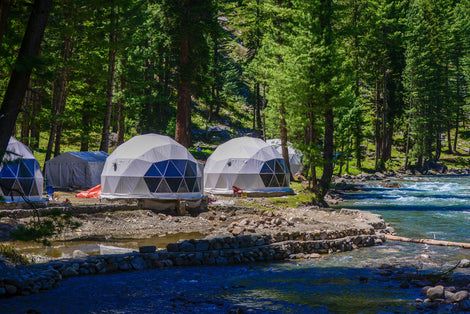Power Generator Noise Reduction Methods
Power generators are key parts of many off-grid setups, especially when solar can’t handle the full load or during stretches of cloudy weather. But one thing people don’t often plan for until it’s too late is the noise. That steady hum or rumble might seem minor at first, but over time it can make relaxing weekends feel like living near a construction zone. Keeping things quiet isn’t just about comfort. It can help reduce stress, support sleep, and avoid neighbor complaints if you're anywhere near others.
For those using solar kits like Jackery solar power generators, reducing generator noise matters even more. You’ve already taken steps to live with a lighter footprint using solar. A noisy backup generator can undo some of that peaceful rhythm. When you’re building a quiet, off-grid setup that works with nature instead of against it, keeping the noise down makes everything feel more in sync. There are a handful of smart strategies that can help quiet things down without giving up reliable power.
Understanding Generator Noise
Before figuring out how to quiet a generator, it helps to know where the noise is actually coming from. Most generators have a few built-in culprits when it comes to sound. Once those parts are identified, it’s easier to work toward solutions that tackle the problem at its source.
Here are the most common things that cause noise in a power generator:
- Engine operation: This is the loudest part of most generators. Combustion engines pop, hiss, and rumble as they burn fuel and run. Even smaller engines can make a lot of noise depending on the design.
- Exhaust system: Much like with cars, the exhaust carries out air and byproducts from the engine. If this system isn’t insulated well or has a basic design, it will amplify sound.
- Vibration: Generators often shake slightly while running. This movement transfers sound into the ground or whatever surface it’s sitting on, making everything around it seem louder.
- Cooling fans: To keep from overheating, generators often include fans or cooling systems. These can add to background whirring or buzzing when running for long periods.
If you’ve ever camped with a backup generator sitting nearby, you’ve likely felt just how persistent that low hum can be. Even if it's parked a decent distance from where you're sleeping or relaxing, the noise can cut through quiet pretty easily. So, reducing the sound means not just closing your ears to it but getting deliberate with your setup.
Effective Noise Reduction Techniques
Once you know where the noise is coming from, you can start making changes that help control it. Some fixes are fairly quick and simple, while others might involve adding to your setup. For quiet-focused off-grid living, every bit helps.
Here are a few options:
1. Use Soundproof Enclosures
A generator inside an enclosure will reach your ears with less volume than one exposed to the open air. These can be boxes made of materials that absorb and deflect sound like insulated wood or composite panels.
- Make sure the enclosure allows for heat to escape. Trapping too much heat could harm your generator.
- Leave space around the generator for airflow and easier access for maintenance.
2. Install Mufflers or Silencers
Much like a car, some generators can accept aftermarket mufflers or specially built silencers to reduce engine noise.
- A silencer on the exhaust system can cut back the sharp engine sounds.
- Look for ones designed for your generator’s model for a better fit and lasting results.
3. Add Rubber Vibration Pads
You can help muffle the low rumble by placing rubber pads or anti-vibration mats under the generator.
- These absorb the shaking energy that would otherwise carry into the ground or surface.
- They come in different sizes, so pick one that covers the base and holds weight without slipping.
Every setup is different, and what works for a large solar home won’t be the same for someone with a lighter footprint relying on a compact Jackery solar power generator. One practical example could be someone with a Jackery setup in a small cabin who uses a portable generator just for battery top-offs during cloudy days. Soundproofing a small nearby shed with an opening for airflow and placing the generator on vibration pads can keep that charging session from disturbing peaceful mornings.
Smart Placement Strategies
Even the quietest generator can sound louder if it's sitting in the wrong spot. Where you put your generator plays a big role in how much noise reaches your ears. Placement is often overlooked, but with a few smart tweaks, it can make a big difference.
Start by placing your generator as far away from your main living or sleeping space as your setup will allow. Every extra foot helps lower the noise that actually reaches you. If you’re running power cords from your generator to a solar battery station like a Jackery solar power generator, use safe-rated extension cables to maximize distance without causing performance loss.
Another helpful approach is to use barriers that block or absorb sound. That could be something natural, like a small hill or thick cluster of shrubs. Or man-made, like a fence or a stack of firewood between you and the generator. If your generator sits on a patio, lean large plywood panels against two sides to reflect noise upward instead of toward your cabin.
Keep the generator off hard surfaces like concrete, as those reflect sound easily. A soft base like sand, gravel, or textured pavers can help soak up some of that noise. Avoid corners or tight enclosed spaces unless they’ve been sound-treated, since sound can bounce off walls and get amplified.
One example that works well for mobile setups, like van dwellers or basecamp-style cabins, is placing the generator downhill or behind an outbuilding. That slight change in elevation and barrier type can muffle the sound without needing any construction.
Regular Maintenance And Upgrade Tips
Generators need to be in good shape if you want them to run quietly. A loud generator doesn’t always mean it’s working harder. It might just mean something’s wrong or starting to wear down.
Stay ahead by doing routine checks. Here are a few things to look out for:
- Loose bolts or nuts that can lead to more rattling than usual
- Dirty air filters that force the engine to work harder and run louder
- Worn-out exhaust components that allow more noise to escape
- Engine oil levels that are too low or too dirty
Even if your generator is fairly new, covering these basics once a month, especially during regular use, can make it hum smoother and softer. Inspecting the housing and muffler regularly can also help catch noise problems early.
If you’ve had your generator for a long time and it’s still louder than you'd like, upgrading to a quieter model could be worth thinking about. Technology continues to improve, and newer backup power units are being built with sound reduction in mind. Look for models with sound-insulated panels, smart throttle systems, and sealed exhausts.
Pairing those upgrades with a Jackery solar power generator means you can rely more on stored solar energy and run your gas generator less often. That way, you cut down both your fuel use and your noise footprint.
Keeping Your Peace and Quiet
A good generator should help power your off-grid life, not take away from it. Quiet operation means fewer complaints, better sleep, and a more natural feel to your environment. You don’t need to accept generator noise as a tradeoff for energy. With the right setup, sound management, and some careful planning, you really can have both power and peace.
If you’re using solar kits like the Jackery setup, that calm lifestyle is already your goal. So it makes sense to take extra steps to make sure every part of your system supports that. A quieter generator turns those early mornings, late nights, and quiet breaks in between into something that feels more like the freedom you set out to find.
If you're looking to power your off-grid setup without adding stress to your daily life, consider how Jackery solar power generators can support your energy goals. At Green Vista Living, we’re here to help you find solar solutions that work quietly and consistently, giving you more time to focus on what matters most—living simply and efficiently.







